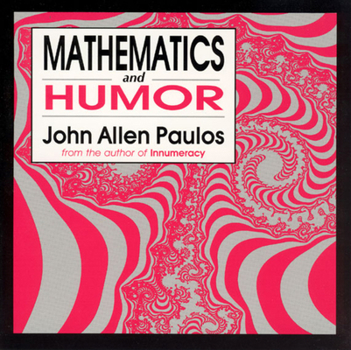Mathematics and Humor
Select Format
Select Condition 
Book Overview
John Allen Paulos cleverly scrutinizes the mathematical structures of jokes, puns, paradoxes, spoonerisms, riddles, and other forms of humor, drawing examples from such sources as Rabelais, Shakespeare, James Beattie, René Thom, Lewis Carroll, Arthur Koestler, W. C. Fields, and Woody Allen. "Jokes, paradoxes, riddles, and the art of non-sequitur are revealed with great perception and insight in this illuminating account of the relationship between humor and mathematics."--Joseph Williams, New York Times"'Leave your mind alone,' said a Thurber cartoon, and a really complete and convincing analysis of what humour is might spoil all jokes forever. This book avoids that danger. What it does. . .is describe broadly several kinds of mathematical theory and apply them to throw sidelights on how many kinds of jokes work."--New Scientist"Many scholars nowadays write seriously about the ludicrous. Some merely manage to be dull. A few--like Paulos--are brilliant in an odd endeavor."--Los Angeles Times Book Review
Format:Paperback
Language:English
ISBN:0226650251
ISBN13:9780226650258
Release Date:November 1982
Publisher:University of Chicago Press
Length:124 Pages
Weight:0.62 lbs.
Dimensions:0.3" x 7.9" x 8.2"
Customer Reviews
4 ratings
awesome!
Published by Thriftbooks.com User , 17 years ago
I am by no means an expert on metaphysics but I thought it was great.
Mathematics and Humor is no joke
Published by Thriftbooks.com User , 21 years ago
I wanted this book for two reasons--first, I read the Paulos' best selling book, Innumeracy, and second, I like both of the subjects. Paulos begins with a brief chapter on definitions of humor by historical philosophers and writers. It's pretty interesting--what is it that makes something funny? His second chapter uses some mathematical and logical examples to help approximate what is going on in most examples of humor. Paulos' main thesis seems to be that the most common example of humor deals with setting up the unexpected incongruity. One of his examples is great. A perverted old man leers at a young virgin girl and says, "What goes in dry and hard, yet comes out soft and wet?" The girl blushes. The old man replies, "Chewing gum." In this example, the joke implied axioms (answers to his question) which were quite different than his chewing gum answer. The greater this incongruity is, the better the punchline (which is why sexual connotations are often found funny). Other chapters discuss variations on this theme, culminating in a theory of catastrophe involving dogs and the model for whether they will fight or run away when confronted. It's quite interesting. I really enjoyed the book, and found it to be quite thought-provoking. Paulos does a great job of explaining many tough mathematical concepts, including Gödel's Theorem. I didn't fully understand Thom's Theorem at the end, but that's okay. One thing to be aware of is that the book is short and leaves you wanting more. I think anybody interested in math will find this book entertaining, even if they're not particularly excited by humor. I do think interest in mathematics is requisite to enjoy this book, however.
Interesting take on two subjects
Published by Thriftbooks.com User , 24 years ago
One thing that most people will appreciate in this book is a better understanding of their mathematics professor's strange sense of humor. I agree with the author that most mathematicians do show a certain, recognizable style of humor. He goes on to explain the ways that mathematical reasoning resembles, and therefore illuminates humor. This book provides an entertaining introduction to mathematical concepts and theory. I'm not sure that I would recommend it as highly on the other side--to comedians. This is more of a philosopher's approach to humor.
serious study of jokes and their mathematical structure
Published by Thriftbooks.com User , 25 years ago
Given the book's title I was surprised at its contents. It contains a lot of very good jokes, to be sure, but it is a serious study of the mathematical structure of certain kinds of jokes. The introductory discussion of the history of ideas about humor was particularly valuable. Very satisfying read!





